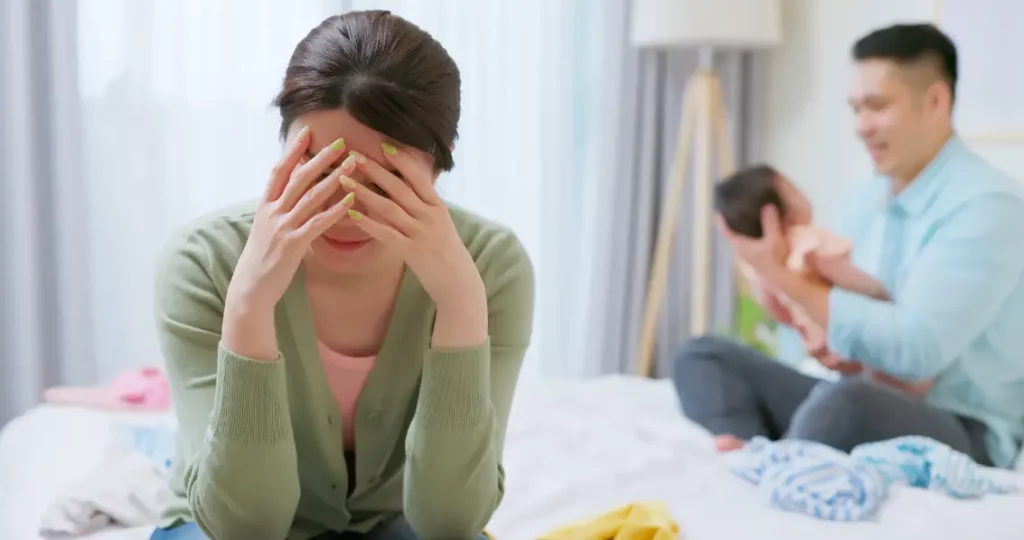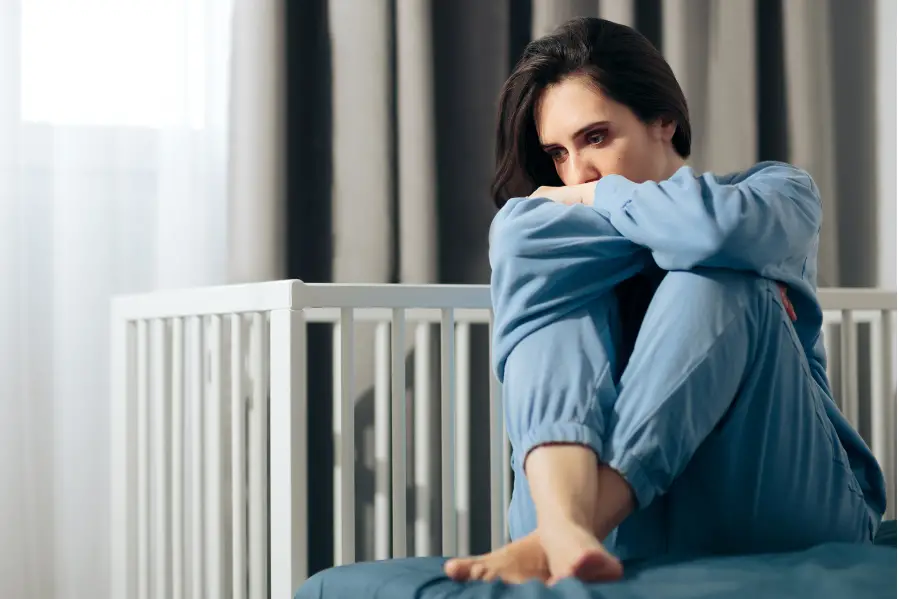
Postpartum depression (PPD) is a common condition that affects many women after giving birth, impacting their physical and mental health. It can be challenging for both mother and partner as it often leads to feelings of sadness, exhaustion, and isolation.
However, you can help your wife through this difficult time with the right support and strategies. Read on to learn how to help wife with postpartum depression and postpartum mood disorders.
What Exactly Is Postpartum Depression?

The term “postpartum depression” gets thrown around a lot, but it’s important to understand what it actually is. Postpartum depression is a type of major depression that can develop in the days or weeks after giving birth.
PPD affects about one in every nine women who give birth in the United States yearly and can cause significant psychological distress for new mothers. Symptoms include extreme sadness, anxiety, and exhaustion, and they can last for several months.
Experiencing postpartum depression can also lead to mental illness, which requires emotional support to guarantee your wife’s recovery. Being a good mother can be very hard if your wife develops postpartum depression after the baby arrives.
One of the most important things to remember when helping your wife with postpartum depression is that you can’t do it alone.
It’s important to seek professional help from a qualified mental health care provider, such as a psychologist or psychiatrist. You can ask your wife a few questions about her feelings, and you can help her join support groups and take advantage of local resources.
However, many people fail to realize how much support they can give to their partner simply by being understanding and present. Here are a few practical tips for how you can help your wife with postpartum depression:
1. Listen and Validate Her Feelings
One of the most important things you can do is find out how she’s feeling and let her know that her feelings are valid. It can be difficult to talk about how you feel if you feel like no one will understand or take your emotions seriously.
Don’t try to tell her how to feel. Just let her know that it’s OK to feel how she does.
2. Encourage Self-Care
Self-care is one of the most important things a person can do when dealing with depression, which is no different with PPD. Encourage your wife to make time for herself and engage in activities that bring her joy. Some ideas include reading, practicing yoga, or taking a relaxing bath.
3. Be Patient and Understanding
It’s important to remember that postpartum depression can be a long, difficult journey. There will definitely be ups and downs, and remaining patient and understanding is important throughout the process.
Don’t expect her to “snap out of it” or get better in an instant; recovery takes time.
4. Educate Yourself on Postpartum Depression
You should also educate yourself on PPD, how it manifests itself, and how to be a supportive partner. Learning more about the condition will help you better understand what your wife is going through, how to identify warning signs of distress, and how to provide the best care possible.
5. Encourage Her to Reach Out for Help
Finally, don’t be afraid to ask for help if needed. Postpartum depression can affect the entire family, so talking to a therapist or joining a support group can be beneficial.
Remember that someone else understands how hard this is and may have some helpful advice on navigating this difficult time. With patience, understanding, and the right help, you can get through this together.
What Causes Postpartum Depression?

PPD can be caused by various factors, including hormonal changes during pregnancy, lack of sleep, and the significant adjustment in lifestyle that comes with caring for an infant. Other common causes include financial difficulties, difficulty adjusting to motherhood, physical ailments, relationship issues, feelings of inadequacy as a parent or partner, and social isolation.
These things can all contribute to the development of postpartum depression, leaving many women feeling overwhelmed and alone. It’s very important not just to recognize PPD symptoms but to understand how it develops so that you can create a plan to help your wife cope with her feelings and better manage any anxiety or sadness she may be experiencing.
Make sure that you take a proactive approach to help your wife. This way, you can ensure that you are doing what is best for her, your new baby, and the rest of your family.
How Can Postpartum Depression Affect Your Wife’s Life?

Unfortunately, PPD can have a huge impact on how your wife lives her life. It can lead to sadness, emptiness, hopelessness, and general unhappiness, affecting how she interacts with others, how much energy she has, how well she sleeps, and how motivated she is to do daily activities. This can take a toll on how she functions daily and how well she takes care of herself.
Postpartum depression can also increase the risk of anxiety, substance misuse, suicidal thoughts, and other mental health issues. All of these can seriously impact how your wife is living her life and how you can support her.
There is also the physical toll PPD can take on your wife’s body. It can lead to a weakened immune system, increased fatigue, and difficulty with regular activities such as taking care of the baby or running errands.
There are even cases when postpartum depression can lead to physical issues such as a weakened heart or higher blood pressure, which puts her at risk for more serious health problems.
It’s essential to recognize how postpartum depression can affect your wife so that you can be best prepared to provide the support she needs. Otherwise, her PPD could have a more destructive effect on her life.
What Are Some Signs of Postpartum Depression?

It’s vital to recognize the signs of postpartum depression in your wife so that you can provide the right kind of help and support. Here are some common symptoms of postpartum depression:
1. Feeling Sad, Hopeless, Numb, or Empty
One of the most common signs of postpartum depression is feeling emotionally drained, empty, or numb. Your wife may also feel overwhelmingly sad and hopeless about the future.
2. Irritability and Anger Outbursts
Your wife may become easily frustrated or angry for seemingly no reason. She may be more irritable than usual and have outbursts that are out of character.
3. Change in Eating Habits and Appetite
Your wife may have changes in her eating patterns, either overeating or not eating enough. She could also be experiencing a decrease in her appetite due to stress and anxiety.
4. Lack of Energy and Motivation
Postpartum depression can lead to feeling exhausted and unmotivated. This can make it difficult for your wife to do tasks that once seemed easy, such as taking care of the baby or completing housework.
5. Trouble Sleeping and Concentrating
It is common for women with postpartum depression to struggle with insomnia and difficulty concentrating. She may have trouble falling asleep or staying asleep, even when given the chance to do so.
6. Loss of Interest in Activities That Used to Bring Her Joy
Another symptom of PPD is losing interest in activities that used to bring your wife joy. She may no longer want to participate in hobbies or social events and may not show enthusiasm for things she once enjoyed.
7. Feeling Overwhelmed and Unable to Cope With Daily Tasks
Postpartum depression can also lead to feelings of intense stress and overwhelm. Your wife may feel like the tasks of everyday life are too much for her to handle or that she cannot cope with them.
8. Low Self-Esteem and Guilt
Low self-esteem and guilt are also common symptoms of postpartum depression. Your wife may feel inadequate or guilty for not being able to do everything she used to do before having a baby. Sometimes, these feelings can lead to self-blame and negative thoughts.
If you recognize any of these signs in your wife, providing her with the support she needs is important. This way, you can help her cope with PPD symptoms and get back on track.
How Does Postpartum Depression Affect Babies?
Since postpartum depression is a serious mental health condition, it can have a major impact on how a baby’s emotional and physical needs are met.
In some cases, mothers with postpartum depression may be less able to tune into their baby’s cues or respond to their needs in the way that would normally be expected. This can lead to disruptions in the bond between the mother and baby, which can have lasting effects if not addressed.
If you are the partner of someone with postpartum depression, you may feel helpless about how to provide support. It is important to understand that although your wife may be struggling, there are steps you can take to help her and the new baby as she goes through this difficult time.
The most important thing is to provide your wife with understanding and love. It is also essential to help her identify how she’s feeling and then work with her to develop a plan to get the support she needs.
Also, make sure that your child is getting the best care possible. This may include helping to feed, burp, and change your baby when needed or helping with household chores and errands.
Additionally, you must take time for yourself and make sure to check in on how you are feeling as well. Postpartum depression can be difficult for both partners involved, so don’t forget to take care of your own needs.
Finally, consider reaching out for professional help. A trained mental health professional can provide guidance and support on handling PPD best. They can provide much-needed insight into managing the various emotions you and your wife are experiencing.
Though PPD can be incredibly difficult, it is possible to overcome this condition with the right support and resources. With the help of your partner, family, and friends, you can get the support your wife needs during this time.
What Happens If Postpartum Depression Is Left Unchecked?
Left unchecked, PPD can have serious and long-lasting consequences for both mom and baby. Below are the long-term effects of postpartum depression on the mother and her child.
For the Mother
1. Developing Anxiety and Depression
One of the long-term effects of postpartum depression is the development of chronic anxiety and major depressive disorder. If left untreated, a mother’s symptoms will likely worsen over time and can even become debilitating.
2. Difficulty Bonding With Baby
When a mother struggles with postpartum depression, it can be difficult for her to connect with her baby and form a strong attachment. This can lead to further emotional and developmental issues for the baby as they grow up.
3. Relationship Troubles With Partner
Unfortunately, postpartum depression can also affect the mother’s relationship with her partner. Studies show that postpartum depression can make it difficult for mothers to maintain healthy relationships with their partners, as it can cause them to become increasingly withdrawn.
For the Baby
1. Delayed Development
Research has found that babies born to mothers struggling with postpartum depression are more likely to experience delayed development in language and motor skills. This is because they may not be receiving adequate stimulation from their mother.
2. Emotional Instability
Babies born to mothers with postpartum depression are also more likely to struggle with their emotions and have difficulty regulating them. This can lead to the further development of social and behavioral issues down the line.
3. Inadequate Nutrition
Postpartum depression can also lead to inadequate nutrition for the baby. When a mother is struggling with PPD, she may not be able to adequately care for her newborn, which can result in them not getting the proper nutrition they need.
These are just some of the long-term effects of postpartum depression that can arise if left unchecked. It is important to seek professional help as soon as possible if you or someone you know is struggling with PPD to avoid these long-term consequences.
Wrapping Up
If you have a wife suffering from postpartum depression, it can be difficult to know how to help her. It’s hard to understand the emotional rollercoaster she may be going through at this time and how you can best support her.
However, with the right knowledge on helping your wife with postpartum depression, you can be a rock for her during this difficult time.
Start by understanding how PPD works and how it can affect your wife’s mental, emotional, and physical health. Remember to be patient and understanding of how she is feeling and how you may feel in return.
Show love and compassion, take on extra household responsibilities, and offer to listen without judgment. You could also look into joining a support group or finding activities that both of you can do together as a way for her to connect with someone who has dealt with postpartum depression.
Remember, your wife is not alone, and help is available. With your continued love and support, she will be able to work through her postpartum depression and come out the other side feeling happier and healthier.
Frequently Asked Questions
Is postpartum depression dangerous?
What can I do to help my wife with postpartum depression?
Encourage her to seek professional help or talk to a postpartum support group. Offer to help with household chores, childcare, or errands so she can take a break and get some rest. Ask how you can best support her during this tough time, and listen carefully to her answer.
How does postpartum depression affect my wife?
She may also have trouble sleeping even when the baby is asleep. Women with postpartum depression may feel guilty for not being able to enjoy motherhood like they thought they would and become isolated from friends and family.
What are some signs of postpartum depression?
Other physical symptoms may include changes in appetite and sleep patterns and lack of energy. Therefore, it's important to learn how to help wife with postpartum depression.


Leave a Reply